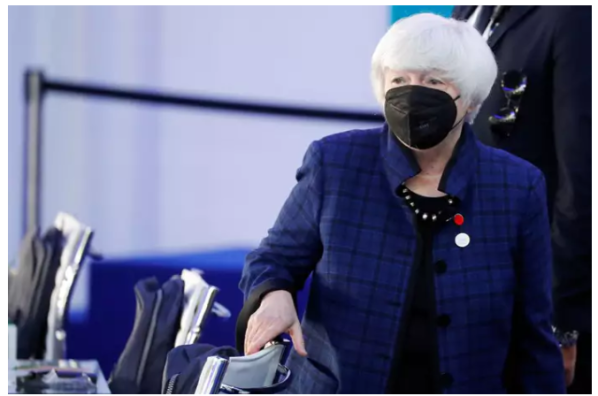
Her comments at a U.S. House Financial Services Committee hearing raised questions about the G20‘s future role in the wake of Russia’s invasion of Ukraine.
Since 2008, the club has served as a key international forum for issues from COVID-19 relief to cross-border debt and also includes China, India, Saudi Arabia and other countries that have been reluctant to condemn Russias actions.
Yellen told lawmakers that Russias invasion of Ukraine and the killings of civilians in Bucha “are reprehensible, represent an unacceptable affront to the rules-based global order, and will have enormous economic repercussions in Ukraine and beyond.”
The United States and its key allies have placed greater emphasis in recent months on the G7 grouping of industrial democracies, whose interests are more aligned, using G7 meetings to coordinate their response to Russias war in Ukraine.
Yellen said that the Biden administration wants to push Russia out of active participation in major international institutions, but acknowledged that it was unlikely that Russia could be expelled from the International Monetary Fund given its rules.
“President Biden‘s made it clear, and I certainly agree with him, that it cannot be business as usual for Russia in any of the financial institutions,” Yellen said in response to a question. “He’s asked that Russia be removed from the G20, and Ive made clear to my colleagues in Indonesia that we will not be participating in a number of meetings if the Russians are there,” Yellen said.
Indonesia holds the presidency this year and will host a finance meeting in July and a leaders summit in November.
A Treasury spokesperson later said that Yellen was referring to an April 20 G20 finance ministers and central bank governors meeting on the sidelines of the IMF and World Bank Spring Meetings in Washington and associated deputies meetings.
The April finance meeting will be held both in-person and virtually and Russias participation is unclear at present.
Russia has said that President Vladimir Putin intends to attend the G20 summit in Bali this year and has received Chinas backing to stay in the group.
ENERGY FLEXIBILITY
Yellen‘s testimony came as the Biden administration announced a new round of sanctions to punish Russia, including banning Americans from investing in Russia and locking Sberbank, Russia’s largest lender and holder of a third of its bank deposits, out of the U.S. financial system, along with other institutions.
But transactions allowing European allies to purchase Russian oil and natural gas were exempted through special Treasury licenses.
Yellen said that flexibility on Russian energy transactions was needed because many European countries “remain heavily dependent on Russian natural gas, as well as oil, and they are committed to making the transition away from that dependence as rapidly as possible.”
But she acknowledged that this would take time.
A complete ban on oil exports from Russia, the worlds third-largest producer after the United States and Saudi Arabia, would likely prompt “skyrocketing” prices that would hurt both the United States and Europe, Yellen said.
She added that she hoped that currently high prices would entice oil companies in the United States and elsewhere to ramp up production in the next six months, which, along with the Bidens release of oil from the U.S. Strategic Petroleum Reserve, may allow for tougher restrictions on Russian oil.
CHINA WARNING
Yellen also issued a warning to China that Treasury was prepared to turn its sanctions tools against Beijing in the event of Chinese aggression against Taiwan, which China claims as a wayward province.
Asked if the United States would take such steps if Taiwan was threatened, she said: “Absolutely. I believe we‘ve shown that we can. In the case of Russia, we threatened significant consequences. We’ve imposed significant consequences. And I think that you should not doubt our ability and resolve to do the same in other situations.”

Leave a Reply